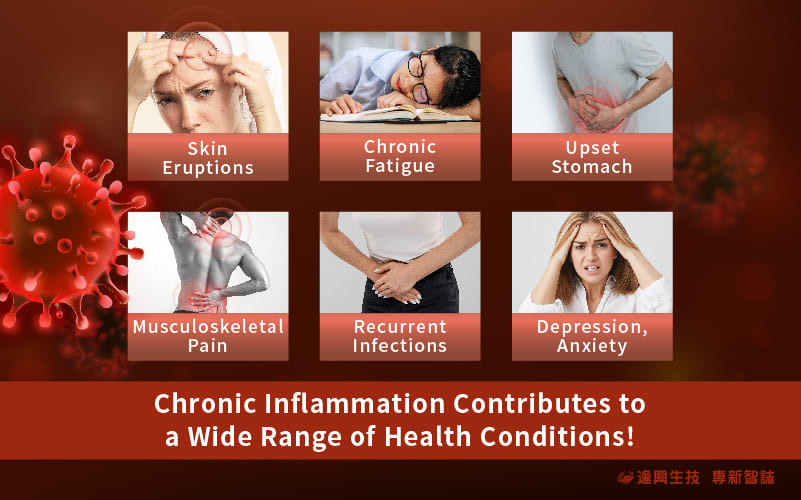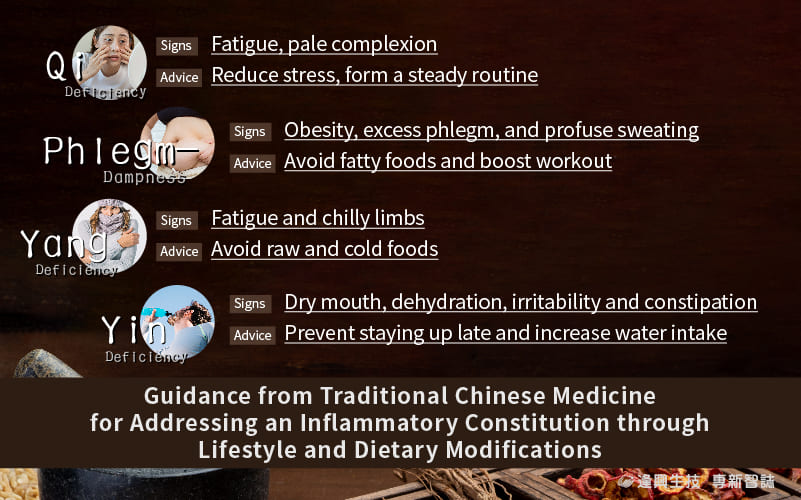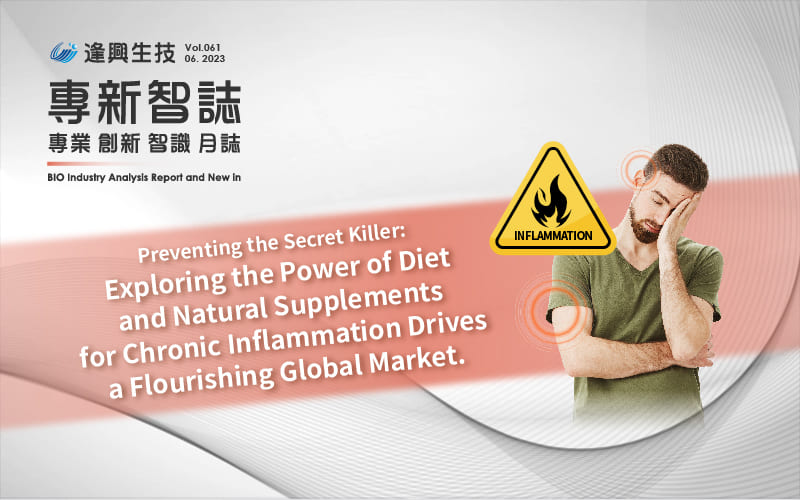In Silence, Chronic Inflammation Undermines Health,
Emerging as the Fundamental Trigger of Diverse Ailments!
Inflammation Contributes to a Wide Range of Diseases
Modern individuals with hectic lifestyles often experience prolonged exhaustion, muscle discomfort, impaired digestion, frequent colds, and enduring health issues. They might also encounter intermittent episodes of dull complexion and skin eruptions. Despite attempting periods of rest, these symptoms persist, leading to escalating fatigue and emotional depletion. The underlying culprit for these issues could very well be “inflammation.” Extensive research indicates that more than 50% of illnesses are linked to inflammation. Conditions like hypertension, hyperlipidemia, diabetes, cardiovascular disorders, and even highly fatal cancers such as liver, pancreatic, and colon cancer, all have a close association with the obstructions and accumulations stemming from chronic inflammation[1]. The insidious nature of inflammation, lying latent within the body, often without overt signs but continually causing harm to healthy tissues, has earned it the moniker “Secret Killer,” a designation bestowed by Time magazine[2].
Inflammatory Response Acts as the Immune System’s Safeguard Mechanism and the Body’s Alerting Signal
The immune system employs the inflammatory response as a safeguarding mechanism, categorized into acute and chronic forms. Acute inflammation is a transient, localized reaction that presents as rapid swelling, heat, and discomfort when the body’s tissues or organs encounter harmful agents. Typically, symptoms arise within a short span, and the inflammatory response subsides once white blood cells have eradicated the detrimental elements.
In contrast, chronic inflammation is an extended and systemic response of the body, primarily triggered by the presence of indecomposable pathogens, viral infections, or autoimmune disorders. This state often results in recurring infections that endure for weeks, months, or beyond, maintaining the body in a protracted inflammatory state. Consequently, this state can impact other well-functioning tissues, contributing to diverse adverse physical and psychological states. Escalations in conditions like eczema, oral ulcers, or allergies might indicate the presence of chronic inflammation in the body.
Data suggests that roughly 40% of the American population experiences chronic inflammation[3]. Research reveals that on a global scale, three out of every five individuals succumb to diseases associated with chronic inflammation[4]. Given these patterns, averting chronic inflammation has become a pivotal facet of sustaining health, fostering the expansion of anti-inflammatory diets and supplements. Predictions indicate that by 2030, the worldwide market for anti-inflammatory interventions is poised to attain a value of 127.5 billion dollars, with an approximate compound annual growth rate of 4.5%[5].

[1] Roth, et al., (2018). The Lancet, 392(10159), 1736-1788.
https://pubmed.ncbi.nlm.nih.gov/30496103/
[2] Inflammation: The Secret Killer | Feb. 23, 2004
https://content.time.com/time/covers/0,16641,20040223,00.html
[3] Are You Inflamed? 5 Signs To Look Out For, Lilli Link, MD
https://www.parsleyhealth.com/blog/5-signs-chronic-inflammation/
[4] Pahwa, R., Goyal, A., & Jialal, I. (2021). Chronic inflammation. StatPearls [Internet].
https://www.ncbi.nlm.nih.gov/books/NBK493173/
[5] Anti-Inflammatory Therapeutics Market – Global Industry Analysis and Forecast 2022-2030
https://www.precedenceresearch.com/anti-inflammatory-therapeutics-market
Addressing Symptoms of Inflammatory Constitution:
A Dual Approach with Diet and Natural Supplements for Chronic Inflammation
Recognizing Indications of a Constitution Susceptible to Inflammation
According to traditional Chinese medicine, imbalances within the body lead to inflammation, stemming from an inability to dispel internal dampness and heat[6][7]. This vulnerability often triggers manifestations of an inflammatory constitution, which can be categorized into four distinct types:
- Yin Deficiency Type: People exhibiting a Yin-deficient constitution often display signs of dehydration, like frequent constipation and excessive sweating. Additionally, they might find themselves becoming easily agitated. Should they stay up late at night, disregard appropriate dietary choices, and fail to maintain adequate hydration, their experiences of dry heat and inflammation could intensify[8].
- Yang Deficiency Type: People possessing a Yang-deficient constitution commonly experience sensations of fatigue and chilliness. Cold extremities may be linked to compromised blood circulation, diminishing the body’s capacity for efficient detoxification and consequently fostering inflammation. To improve their condition, they should moderate their intake of cold foods, prioritize adequate rest, and engage in increased physical activity.
- Qi Deficiency Type: Persisting fatigue can contribute to inflammation, particularly among those with a Qi-deficient constitution, characterized by diminished physical vitality, pale skin tone, and accelerated breathing. For these individuals, effective stress management and adherence to consistent sleep routines are essential.
- Phlegm-Dampness Type: Phlegm-dampness constitution individuals often show obesity, excess phlegm, and profuse sweating. They lean toward high-sugar, high-fat diets that promote inflammation. To counter this, participate in outdoor physical activities more frequently and exercise restraint in alcohol consumption and dietary choices.

Creating a Non-Inflammatory Constitution Requires Proper Nutrition
Distinguishing from vegetarian or boiled meals, an anti-inflammatory diet calls for a well-proportioned consumption of fruits, vegetables, nuts, whole grains, fish, and healthy fats. This aligns with the Mediterranean diet[9], emphasizing unsaturated fatty acids, limited red meat, and ample fruits and vegetables.
Amidst the pandemic, NRICM101, a traditional Chinese medicine formula targeting COVID-19, has been widely regarded as a panacea; however, its cooling nature may induce imbalances, rendering it unsuitable for extended use to boost immunity for the general public[10]. For sustained well-being, consider fortifying nutrients through dietary supplements like EPA, DHA, turmeric, and Vitamin D3[11]. Wel-Bloom has diligently crafted natural supplements for inflammation and recently introduced Wel-TriGo™, a multifunctional compound plant-based ingredient. This innovation is ideal for brands aiming to elevate their supplement formulations beyond market competitors.
[6] 6大體質易慢性發炎!中醫推抗炎3食療,遠離過敏更助眠
https://www.edh.tw/media_article/885
[7]【中醫九型體質自我檢測】你係寒底定熱底?哪種體質最易敏感、怕凍?不同體質有獨特養生方法?UrbanLife Health 健康新態度
https://urbanlifehk.com/article/95780/中醫九型體質檢測-寒底-熱底-陽虛-陰虛-氣虛?utm_campaign=ULHK-Web-CopyContent&utm_source=ULHK&utm_medium=Web-CopyContent
[8]愛喝咖啡、手搖杯注意!陰虛、燥熱體質,你有這些狀況嗎?
https://www.edh.tw/article/27081
[9] Foods that fight inflammation, Harvard Health Publishing
https://www.health.harvard.edu/staying-healthy/foods-that-fight-inflammation
[10] 清冠一號怎麼吃?月經來、拉肚子能不能使用?5大QA詳解
https://health.gvm.com.tw/article/91933
[11] 「好累」都是「發炎」搞的鬼!一分鐘鑑定身體在發炎嗎?
https://heho.com.tw/archives/62130
